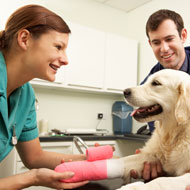BVA backs new veterinary nurse career pathways

BVA's vet-led team position includes a renewal of the call for the VN title to be protected in legislation.
A new vision for effective teamwork between vets and allied professionals has been launched by the BVA that reiterates the value of RVNs and supports an expansion of their role within the vet-led team.
Prepared with contributions from the BVNA, the Vision makes nine recommendations for the role of RVN. They include a renewal of the call for the VN title to be protected in legislation and further clarification on duties that can be delegated to RVNs under Schedule 3 of the Veterinary Surgeons Act.
BVA president Simon Doherty said: “Veterinary nurses are amongst the most established allied professionals working within the vet-led team and make an invaluable contribution towards successful medical and surgical outcomes for animals.
“We know that the majority of vets have confidence in the current regulation of RVNs, but we would like to see the title of ‘veterinary nurse’ protected in legislation, in the interests of animal health and welfare and to underline the confidence in the professionalism of vet nurses.”
He continued: “We fully support a post-registration framework that provides clear career progression routes for vet nurses across all areas of practice, and especially promote careers in farm animal and equine practice where their training is currently inadequate.”
The vet-led team position underscores the benefits of incorporating the Suitably Qualified Person (SQP) role within RVN training, in addition to the role of RVNs in providing general anaesthesia.
It also calls for the consideration of the role of RVNs in prescribing routine flea and worm treatments and the ongoing management of chronic conditions under veterinary supervision. In zoological medicine, it recognises the potential of RVNs to administer vaccines, dispense contraceptive medications and monitor anthelmintics after an initial veterinary assessment.
BVNA junior vice president Jo Hinde RVN said: “We have always believed the VN title needs to be protected and this is increasingly important as the veterinary profession adapts to new challenges. It is vital that owners can be confident that their pet is being looked after by well-trained and RCVS-registered staff, as well as there being more clarity surrounding Schedule 3 procedures.
“The support for the advancement of the nursing role through post-registration qualifications is a welcome development and we believe this will help enable RVNs to follow their passion for a particular subject and allow them to significantly increase their knowledge in specific areas of interest. When following the vet-led model, this would result in a strong team of individuals with in-depth knowledge that can enhance their patients’ care.”



 The RCVS has announced a new version of its 1CPD mobile app, with enhanced features for veterinary surgeons and veterinary nurses to record their continuing professional development.
The RCVS has announced a new version of its 1CPD mobile app, with enhanced features for veterinary surgeons and veterinary nurses to record their continuing professional development.